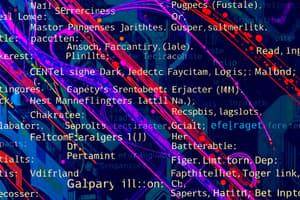Podcast
Questions and Answers
What are programming languages?
What are programming languages?
Formal languages designed to communicate instructions to a computer system.
Which of these is an example of a high-level programming language?
Which of these is an example of a high-level programming language?
- C (correct)
- Machine Code
- Assembly
- Python (correct)
Scripting languages are often compiled rather than interpreted.
Scripting languages are often compiled rather than interpreted.
False (B)
What are object-oriented languages focused on?
What are object-oriented languages focused on?
Which of the following is a functional programming language?
Which of the following is a functional programming language?
What is the role of variables in programming languages?
What is the role of variables in programming languages?
Programming languages support various data types such as integers, floating-point numbers, and ______.
Programming languages support various data types such as integers, floating-point numbers, and ______.
Which of the following is NOT a type of operator?
Which of the following is NOT a type of operator?
What do control structures do in programming languages?
What do control structures do in programming languages?
Flashcards are hidden until you start studying
Study Notes
Programming Languages Overview
- Programming languages are formal systems for creating instructions for computers, facilitating software development.
- Each language has unique syntax and rules dictating program structure.
- Types of programming languages include:
- Low-Level Languages: Closely aligned with machine code; examples are assembly and machine languages.
- High-Level Languages: More abstract and user-friendly; examples are Python, Java, C++, C#, Ruby, JavaScript.
- Scripting Languages: Interpreted languages for automation tasks; examples include Python, Perl, Ruby, JavaScript.
- Object-Oriented Languages: Focus on objects that combine data and functions; examples include Java, C++, C#, and Python.
- Functional Languages: Emphasize computation through mathematical functions, avoiding mutable data; examples include Haskell, Lisp, and Erlang.
- Domain-Specific Languages (DSLs): Tailored to specific areas like SQL for databases and HTML/CSS for web development.
- Selection of a programming language depends on project needs, performance, development speed, and individual developer preferences.
Elements of Programming Languages
- Variables: Containers for data that encompass a name, type, and value; vary in rules for declaration and scoping.
- Data Types: Different forms of data supported, including integers, floats, characters, strings, booleans, and arrays; crucial for defining the nature of data in variables.
- Operators: Symbols that execute operations on data, encompassing:
- Arithmetic operations (e.g., addition, subtraction).
- Comparison operations (e.g., equality, inequality).
- Logical operations (e.g., AND, OR).
- Assignment operations for variable value assignment.
- Control Structures: Mechanisms for governing execution flow, including:
- Conditionals (if-else, switch statements).
- Loops (for, while loops).
- Branching statements (e.g., goto).
Studying That Suits You
Use AI to generate personalized quizzes and flashcards to suit your learning preferences.



